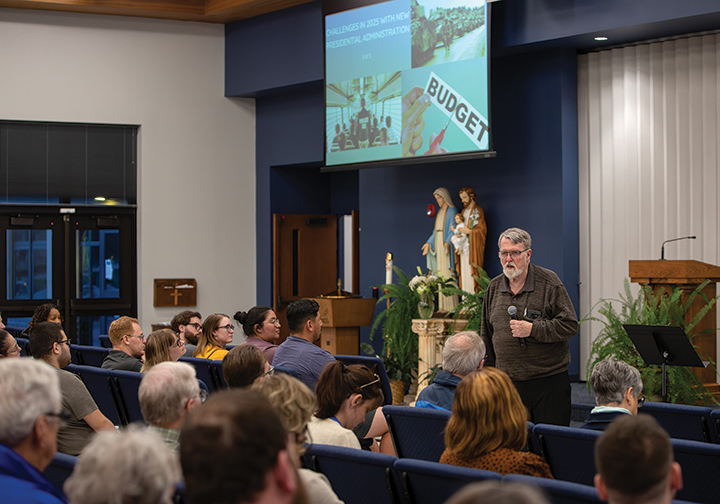
by Jan Dixon
Special to The Leaven
OLATHE — Pope Francis has outlined specific action points for the Catholic response to refugees and migrants, emphasizing welcome, protection, promotion and integration.
But ever since Casa del Migrante opened its doors in Tijuana, Mexico, in 1987, it has done exactly that — providing protection and support to the increasing numbers of migrants arriving at the border awaiting legal entry into the United States.
Father Pat Murphy, a member of the Missionaries of St. Charles, Scalabrinians, has met many migrants in his time as director of Casa del Migrante.
Originally from New York, he served as head of Hispanic ministry in the Archdiocese of Kansas City in Kansas for 10 years, as well as in many other roles prior to that.
Now a resident of Tijuana, he was in the metro area recently to make a presentation at St. Paul Parish in Olathe.
“I’ve had many opportunities in my life to learn,” he said to those in attendance, “but I’ve learned a lot more from migrants.
“Like how to live with less.”
Beans and rice and tortillas make up most of the menu at the Casa, so everyone does what they can with what they have. And they have much to offer migrants. The Casa is more than walls, beds and food.
“We want to be a home for those who have had to leave theirs,” said Father Pat. “We want to be a place of hopefulness.”
The organization provides safe and secure spaces where migrants can rest, recharge and access vital resources, serving as a temporary home (usually not exceeding 30 days) during their journey. It provides essential resources, including shelter, food, medical care and spiritual guidance, to meet the immediate needs of migrants.
Casa del Migrante works to help migrants integrate into society and find sustainable solutions for their future, including education, employment and access to legal assistance.
Free education classes are offered to migrants and community members alike. Barbering, acrylic nails, balloon decoration, photography, barista, electricity, welding, Bible and English are a few courses that aim to help people develop better tools in order to get better jobs.
Migrant children attend school and are cared for while parents train or work.
Some will still move on but some will stay in Tijuana, said Father Pat, making it a stronger community.
Pope Francis and the recently canonized St. John Baptist Scalabrini, he continued, were of the same mind on the subject of migration: People have the right not to migrate, but we also need to protect the right to migrate.
Migration is the result of various reasons ranging from extreme poverty and lack of economic opportunity to political unrest or threats from gangs and other organized crime.
“I believe every country has the right to regulate its border but we must find ways to do it with human dignity,” Father Pat emphasized.
Casa del Migrante is committed to protecting the human rights and well-being of migrants, especially those who face danger and exploitation during their migration journeys.
“In my 12 years at the Casa, I have met close to 40,000 people. And without a doubt, the vast majority — 98 percent — are not criminals, but rather hardworking people just trying to survive and provide their families with a better life,” said Father Pat.
Casa life has experienced significant stages of change over the years, he said. First was an increased population of deported men. In 2016, it was the arrival of the entire world. Next, caravans of migrants arrived at the door. 2020 saw the pandemic and now the political changes affecting asylum.
The greatest need at this time for the work at the Casa to continue is financial because significant sources of funding to Mexico have been taken away. Operating the home and its training center requires a minimum of 23 employees, plus many volunteers, said Father Pat. Approximately 65% of the Casa’s income goes to staff salaries and taxes.
“If I could wave a magic wand,” he said, “I would ask for the funds to pay the salaries for the next six months.”
If funds can be found to keep the Casa open, this will give the people the support they need to possibly establish themselves in Tijuana and not risk crossing the border.
“St. Paul Parish has had a long and close relationship with the Casa del Migrante in Tijuana,” explained Father Michael Hermes, pastor of St. Paul Parish. “Over the years, we have sent volunteers to help out, monetary donations to help pay the bills and the famous ‘men’s underwear drive’ in 2017. We consider our support of the Casa to be a corporal work of mercy mentioned in [the Gospel of] Matthew 25.”
Parishioners Tony Rupp and John Martin volunteered in Tijuana a year ago and both claimed that Casa del Migrante is an amazing place that provided much-needed help to those in need.
“Seeing the migrant families and hearing the story of their journey to the border really changed my life,” said Martin.
The evening’s presentation was summed up by parishioner Claudia Fellhoelter, who said, “How beautiful is our Catholic faith. It gives us a strong foundation to serve the world.”






